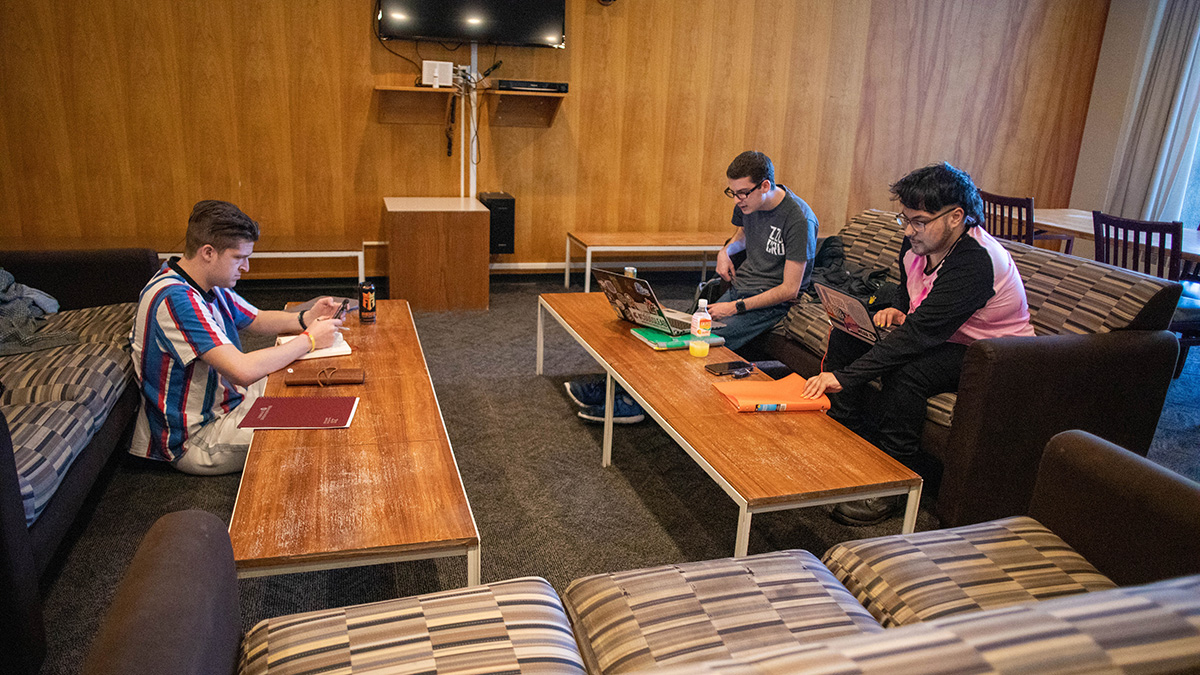
Residence Life Staff
Residential Education Directors (RED)
Residential Education Directors (REDs) are full-time professional staff who live in and direct the halls. They also supervise the team of Resident Advisors (RAs) who live and work in the halls.
RED's hold Master's degrees in areas of student development and go through extensive training. They are available to help students with needs ranging from housing issues to home-sickness.
Resident Advisors
There are over 200 Resident Advisors (RAs), who are students leaders who live in the halls. They are trained in community building, conflict resolution, emergency response, diversity awareness, and academic resources. They put on programs to help residents become involved on campus and make positive choices during their college experience.
Programs & Community
Resident Advisor Programs
Resident Advisors in every hall organize and put on programs and events each semester to help students get to know their hallmates and everything that WSU has to offer. Examples of programs include movie nights, yoga classes with University Recreation, crafts, and guest speakers.
Hall Government
Each residence hall has an elected hall government that helps put on events and make decisions on behalf of the hall.
The Residence Hall Association (RHA) is the campus-wide student group that represents and advocates for all residence halls at WSU Pullman.
Learning Living Communities
Learning Living Communities (LLC) connect students with similar interests and emphasize what they're learning in the classroom. Students can apply for LLC's later in the spring.
Safety
Apartment Safety
Safety regulations are based upon common causes of fires in residential structures. They provide you with information to make you and your home fire-safe. If you have questions or desire further information on fire prevention or fire survival, please give your University Fire Department a call at 335-1766.
- Portable space heaters are not permitted.
- Heat producing appliances such as lamps, grow lights, or sun lamps, should not be operated in confined spaces or in close proximity to combustible material.
- Electric cooking equipment such as hot plates and coffee pots must be placed on a non-combustible surface.
- Do not burn candles near combustible material. When using candles, keep a close watch on them.
- All exit-ways, hallways, doorways, stair-ways, landings, and walkways must be kept free at all times of obstructions or impediments to quick exit. This includes aisles in storage rooms. The University reserves the right to remove items that create a hazard.
- Apartments must be kept free from accumulation of rubbish and unwanted items.
- Keep areas near electrical baseboard heaters (Nez Perce and Columbia) clear of combustible materials at all times.
- No smoking is allowed.
- Kitchen vent hoods, filters, ovens, and burners must be cleaned regularly and kept free of grease build-up.
- Park vehicles no closer than 15 feet from a fire hydrant.
- Keep electrical cords maintained in good condition.
- Do not use extension cords as a substitute for fixed wiring. Do not run extension cords through walls, ceilings, floors, doorways, or windows. Extension cords should not be compressed, coiled, or constitute a tripping hazard.
- Multiple outlet devices which plug directly into outlets are not permitted.
- Extension cords must be no less than 16 gauge. Extension cords used with grounded electrical systems must have three-wire, three-prong, ground protection.
- Electrical wires or fixtures must not be altered or modified.
- Electrical face plates must be replaced if damaged or missing.
- Electrical breaker or fuse panels must be readily accessible and clearly marked. If they are not marked, notify Housing Services Maintenance.
- Test the operation of each battery-powered smoke detector to ensure performance, and change batteries when necessary.
- Holiday decorations must be fireproofed or non-combustible.
Residence Hall Safety
Maintaining a safe and secure residence hall is a high priority at Washington State University. All of our residence halls have fire sprinklers, smoke detectors and comply with National, State and University fire codes. To see educational videos about fire safety in the residence halls, please take a look at these important videos (located at the bottom of the page) provided to us by the Center for Campus Fire Safety.
The living areas of all residence halls are locked 24 hours per day, with the exception of McEachern Hall. Residents are encouraged to take an active role in maintaining a safe and secure residence hall environment. All guests are escorted by their host resident in order to further ensure the safety of the community. Additionally, we have student staff on "duty" walking the floors at night for safety and community development purposes. A professional staff member is on duty 24 hours a day and is accessible through hall staff or the main housing office.
For additional information about living in a Residence Hall room, take a look at this year's housing contract.
If you are interested in bunking your bed please read the information on your residence hall page.